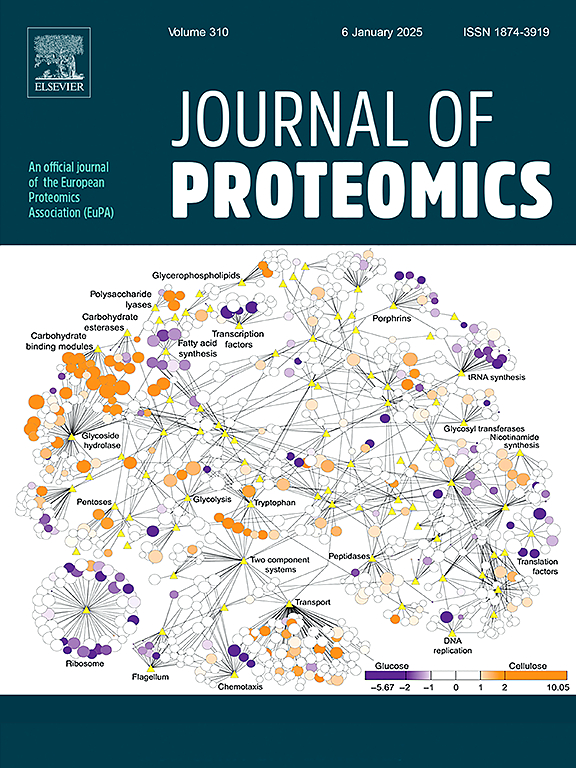A combined proteomic and metabolomic analysis of the early aborted embryonic tissues with maternal COVID-19 infection
IF 2.8
2区 生物学
Q2 BIOCHEMICAL RESEARCH METHODS
引用次数: 0
Abstract
COVID-19 still spreads worldwide, and repeated infections are hard to avoid. Maternal infection during pregnancy is associated with adverse maternal and neonatal outcomes. Our study used a multi-omics profiling method to explore the proteome and metabolome alteration in early embryonic development after COVID-19 infection. A total of 30 chorionic tissues after artificial abortion (15 infection and 15 no-infection samples) were collected, and the UHPLC-MS/MS and LC-MS/MS were applied in the present study. As a result, 311 significantly differentially expressed proteins were identified. The function annotations revealed that the thermogenesis pathway is the most significantly enriched signaling pathway; PRKAG2, IGF1R, and RPS6KB2 were identified as the hub proteins. There were 359 metabolites significantly altered after infection. The functional annotations revealed that amino acid metabolism was significantly affected, especially beta-alanine metabolism, glutamate metabolism, and histidine metabolism pathways. The metabolites in ovarian steroidogenesis showed a down-regulating trend in the infection group. Finally, we combined the results of proteins and metabolomics analysis. The biosynthesis of the cofactors pathway was identified as significantly enriched in both proteomics and metabolomics datasets. Our findings provide a network of protein regulation and metabolite perturbation during early embryonic development with COVID-19 infection. Our findings can provide valuable insights for further exploration of the complex mechanism of COVID-19-associated pregnancy complications and outcomes.
Significance
COVID-19 has developed into the most prominent and deadliest pandemic respiratory disease in the world, and repeated infections are complicated to avoid. COVID-19 infection during pregnancy increases the risk of adverse maternal and neonatal outcomes, such as preterm birth and stillbirth. However, previous studies mainly focused on its effect on pregnant women, such as the clinical characteristics and gestation outcomes. There is no relevant report about the effects of virus infection on embryos in early pregnancy. The effects of COVID-19 infection changes of the proteins and metabolites during early embryonic development are undefined. Our findings provide an association between protein regulation, metabolite perturbation, and COVID-19 infection, which can provide valuable insights for further exploration of the complex mechanism COVID-19 COVID-19-associated pregnancy complications and adverse pregnancy outcomes.

母体感染COVID-19的早期流产胚胎组织的蛋白质组学和代谢组学联合分析
COVID-19仍在全球传播,重复感染难以避免。妊娠期孕产妇感染与孕产妇和新生儿不良结局相关。本研究采用多组学分析方法探讨了COVID-19感染后早期胚胎发育中蛋白质组和代谢组的改变。采集人工流产后的绒毛膜组织30例(感染标本15例,未感染标本15例),采用UHPLC-MS/MS和LC-MS/MS进行研究。结果鉴定出311个显著差异表达蛋白。功能注释显示,产热通路是富集最显著的信号通路;PRKAG2、IGF1R和RPS6KB2被鉴定为枢纽蛋白。感染后有359种代谢物发生显著改变。功能注释显示氨基酸代谢受到显著影响,尤其是β -丙氨酸代谢、谷氨酸代谢和组氨酸代谢途径。感染组卵巢类固醇生成代谢产物呈下调趋势。最后,我们将蛋白质和代谢组学分析的结果结合起来。在蛋白质组学和代谢组学数据集中,辅助因子途径的生物合成被鉴定为显著富集。我们的研究结果提供了COVID-19感染早期胚胎发育过程中蛋白质调控和代谢物扰动的网络。我们的研究结果可以为进一步探索covid -19相关妊娠并发症和结局的复杂机制提供有价值的见解。意义:新冠肺炎已发展成为全球最突出、最致命的大流行性呼吸道疾病,反复感染难以避免。妊娠期感染COVID-19会增加早产和死胎等孕产妇和新生儿不良结局的风险。然而,以往的研究主要集中在其对孕妇的影响,如临床特征和妊娠结局。关于病毒感染对妊娠早期胚胎的影响尚无相关报道。COVID-19感染对早期胚胎发育过程中蛋白质和代谢物变化的影响尚不明确。我们的研究结果提供了蛋白质调控、代谢物扰动与COVID-19感染之间的关联,为进一步探索COVID-19相关妊娠并发症和不良妊娠结局的复杂机制提供了有价值的见解。
本文章由计算机程序翻译,如有差异,请以英文原文为准。
求助全文
约1分钟内获得全文
求助全文
来源期刊

Journal of proteomics
生物-生化研究方法
CiteScore
7.10
自引率
3.00%
发文量
227
审稿时长
73 days
期刊介绍:
Journal of Proteomics is aimed at protein scientists and analytical chemists in the field of proteomics, biomarker discovery, protein analytics, plant proteomics, microbial and animal proteomics, human studies, tissue imaging by mass spectrometry, non-conventional and non-model organism proteomics, and protein bioinformatics. The journal welcomes papers in new and upcoming areas such as metabolomics, genomics, systems biology, toxicogenomics, pharmacoproteomics.
Journal of Proteomics unifies both fundamental scientists and clinicians, and includes translational research. Suggestions for reviews, webinars and thematic issues are welcome.
 求助内容:
求助内容: 应助结果提醒方式:
应助结果提醒方式:


